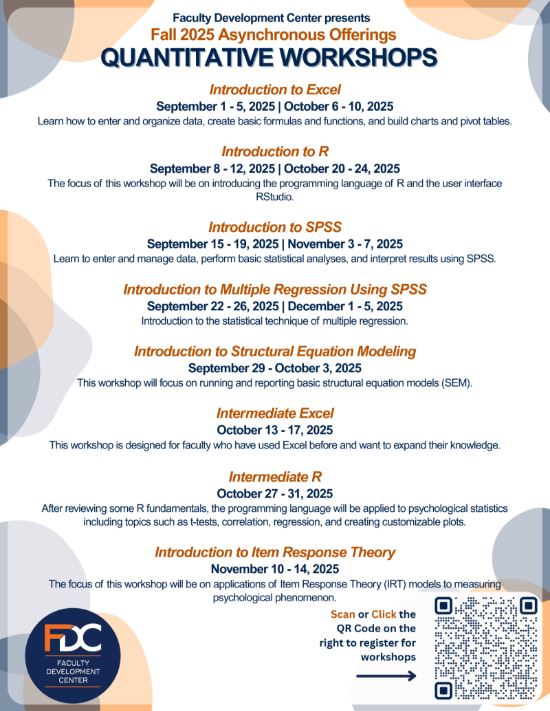Quantitative
Listed below are FDC workshops centered around quantitative methods that are not part of one of the certificate or badge programs.
Introduction to Excel
Facilitated by Kathleen Preston
Learn how to enter and organize data, create basic formulas and functions, and build charts and pivot tables.
Introduction to R
Facilitated by Kathleen Preston
The focus of this workshop will be on introducing the programming language of R and the user interface RStudio (to make R prettier) and applying R to inferential psychological statistics. This workshop will begin with a brief installation tutorial, interacting with the RStudio user interface, and an overview of some R programming basics and key functions.
Introduction to SPSS
Facilitated by Kathleen Preston
This hands-on workshop will serve as an introduction to using SPSS, a powerful computer program used for doing statistical analysis of data for research and other projects. Learn to enter and manage data, perform basic statistical analyses, and interpret results using SPSS.
Introduction to Multiple Regression Using SPSS
Facilitated by Kathleen Preston
Introduction to the statistical technique of multiple regression, the appropriate applications of the technique and statistical considerations when including multiple predictors. It will conclude with a demonstration of the common model selection algorithms (forward selection, backward elimination, and stepwise regression) using SPSS.
Introduction to Structural Equation Modeling
Facilitated by Kathleen Preston
This workshop will focus on running and reporting basic structural equation models (SEM). We will begin with a conceptual overview of SEM focusing on the Bentler-Weeks formulation. Presuming the data have met the necessary assumptions (reviewed briefly), we will cover how to specify a basic SEM for analysis using the Diagrammer in EQS to write nearly all the necessary EQS syntax to run an SEM model. We will examine the output and discuss “what to report” (e.g., adequacy of the measurement model, recommended fit indices, etc.), examine model modification indices, and present effect decomposition. Finally, we will translate the model developed in the EQS Diagrammer, along with the EQS output, into a manuscript-ready model using LaTeX software.
Intermediate Excel
Facilitated by Kathleen Preston
This workshop is designed for faculty who have used Excel before and want to expand their knowledge. Improving formatting, organizing data, highlighting key information, and creating formulas/links between sheets. Specifically, we will be using Excel to quickly summarize multiple sheets of data into one, turn long lists and reports into easy to read tables, use formulas to check whether cells pass or fail specified rules, create links between cells so that they update automatically, and highlight targets, trends, duplicates and errors with Conditional Formatting.
Intermediate R
Facilitated by Kathleen Preston
The focus of this workshop will be on utilizing the programming language of R and the user interface RStudio for running inferential statistics. This workshop will begin with a brief overview of some R programming basics and key functions. After reviewing some R fundamentals, the programming language will be applied to psychological statistics including topics such as t-tests, correlation, regression, and creating customizable plots.
Introduction to Item Response Theory
Facilitated by Kathleen Preston
An essential aspect of psychological research is the measurement of individuals on a construct of interest. Furthermore, accurate measurement of individuals is imperative when high-stakes decisions are involved. Therefore, much of psychological research comprises the development, revision, and application of measurement instruments. The focus of this workshop will be on applications of Item Response Theory (IRT) models to measuring psychological phenomenon. The workshop will begin with a brief discussion/review of related topics (e.g., classical test theory, logistic regression). After establishing IRT fundamentals, the assumptions and modeling techniques of IRT models for dichotomous data will be illustrated conceptually using modern statistical software, R. Finally, utilization of various dichotomous IRT models to inform scale revision will be demonstrated and applied to example datasets. Basic knowledge of R is recommended, but not required.
Workshop Flyer

Click to Enlarge
